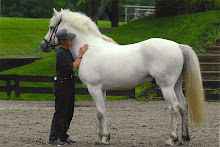Bill
and Dorothy Berloni of William Berloni Theatrical Animals
http://www.theatricalanimals.com/
Bill
Berloni got his start training dogs for the role of Sandy in the 1976 Broadway
hit Annie and has been bringing
wagging tails to audiences ever since. Currently he has Roxie helping Audra
McDonald in Lady Day, Trixie in Bullets Over Broadway and is in
pre-production of Because of Winn Dixie with
his wife and partner, Dorothy. Both have
given their lives over to finding, training and providing a home for their
canine stars as well as finding work for other animal actors. In addition, Bill
is a behavioral consultant for the Humane Society of New York and does lectures
all over the country.
I
was lucky enough to catch the two in-between shows and caring for their pack of
dogs at their farm in Connecticut.
RV: Discovering Sandy and learning how
to bring out the performer in shelter dogs has been an adventure for you. What
does it take to do what you do?
BB: I like to have a year to get a shelter
dog ready for a role. That includes getting it healthy since most shelter dogs
have health concerns, giving it 3 months to socialize and learn basic obedience
then 6 more months for me to develop their natural talents. But often I’m given a limited amount of time
depending upon the director’s needs. In those cases, I tell the director
they’ll get what they get because I won’t push a dog.
DB: It’s
basically a 24-7 lifestyle. We keep most of our dogs here at the farm when they
aren’t working a show. I’ve got a
full-time assistant who does much of the socialization and acclimatization work
so I can take care of administrative details like making sure the dogs and
their handlers are at the right place.
Bill has to oversee every job as well to make sure the dogs are being
treated fairly.
BB: It
takes a lot of good people doing good things.
RV: You
have to have 2 dogs for each role generally as well?
BB: Yes, everyone has the right to get
sick so we have to make sure there’s a back-up ready just in case something
goes wrong. Plus we have all the retired dogs here. They’re part of our
family. Also, any dog that I’ve brought
home that did not like performing will stay here until we find a good home for
them.
DB: Our life is largely organized
around our dogs because their work requires them to do 8 shows a week, 52 weeks
a year for several years. In order to keep them used to their work schedules we
feed after 11 p.m. because that is when the show is over. But otherwise when they are home they are
off-duty, so they get to be dogs.
BB: Letting
them be who they are—that is, allowing them to express their breed
characteristics and individual personalities—is key to their mental health but
also to the type of work they do when they perform. Ethically, I can only get
them to do what is in their nature to do.
RV:
What do you mean by ethically?
BB: My animals aren’t robots and don’t
just do tricks. They are beings who deserve the same respect given to human
actors—well, maybe better! I don’t care who the director is or how important it
is to get the shot, I will not ask my animals to do something that isn’t good
for them. If my dog is stressed, then they’ll have to wait until it’s ready. I
like to tell directors that if they do it my way, they’ll get it in one
take. You can’t force nature.
DB: That’s why Bill is so good at what
he does- he has an instinctive sense of what is really going on inside the
dog. He’s not a dog-whisperer, he’s a
dog-listener because he brings out the true nature of that dog. It shows in
their performance.
BB: There’s no point in asking anybody,
especially an animal, to do anything that makes it unhappy. It is a challenge however because it has cost
us jobs. It’s something everyone has to
think about: how to make a living and be ethical at the same time. But our family, our employees and our dogs
are more important to us than fame or fortune.



No comments:
Post a Comment